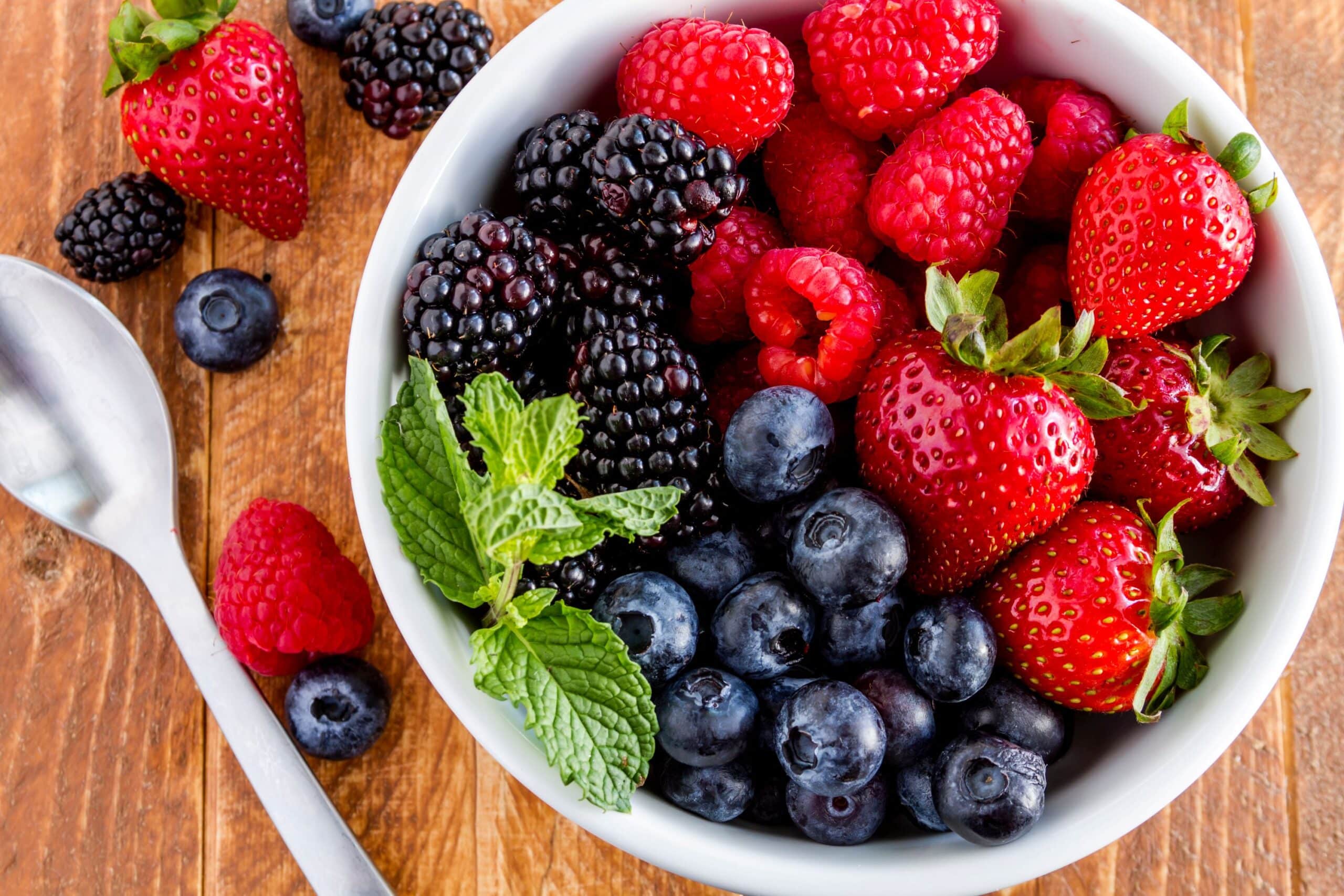People have been eating berries, long before we knew much about medicine, as an important source of energy, now we know there is a lot to this group of foods such as the important anti-aging antioxidant group of flavonoids. Most berries contain many types of these beneficial compounds, but purple berries appear to be the richest in anthocyanins.
Anthocyanins are unstable, break down easily, and the body is only able to absorb a small percentage of what is consumed, thus, to maximize the anti-aging benefits of the anthocyanin content it is best to obtain it from the most nutrient-dense sources available. Typically, the easiest way to identify these is to look for natural foods with the darkest and most vibrant colors for these rich antioxidant sources. When digested anthocyanins have been found to be able to cross the blood-brain barrier and travel directly to the hippocampus where they can have a beneficial impact on memory as well as learning.
Beneficial antioxidant properties are not the only thing offered by anthocyanin-rich berries. “It’s not only the antioxidant capacity that’s important; it’s their anti-inflammatory capacities, as well as their direct effects on the brain,” Dr. Barbara Shukitt-Hale of Tufts University in Boston explained. “In one of our studies, we found that blueberries and strawberries increased neurogenesis, which is the process of making new neurons in the brain…and we also saw changes in signaling and communication in the brain—the positive signals go up while the negative signals go down. So we think that antioxidants are important, but it’s not the whole story.”
It is not clear as to every aspect of what makes these purple berries so advantageous to cognitive health, but studies have revealed that improvements in the brain can occur rather quickly when they are incorporated into our daily diets, such as one study of elderly people who experienced improved memory after following a healthy diet that included blueberries for three months that was conducted by Dr. Shukitt-Hale.
Dr. Paual Brickford of the Morsani College of Medicine in Tampa Florida has also conducted studies revealing that diets rich in blueberries can offer protection against cellular damage from oxidative stress, decrease inflammation of the brain, and in general enhance the health of brain cells overall.
Other research has revealed that blueberry consumption can help to improve motor skills such as balance, coordination, fluid intelligence, cognition skills, and memory. These benefits are not just reserved for later in life either as research has shown that children between the ages of 7-10 continued to improve memory and problem-solving abilities proportional to the number of purple berries they ate, and eating more blueberries was concluded to result in higher test scores.
A review of available research published in the Journal of Agricultural and Food Chemistry suggests that berry fruits like blackberries may help to improve brain health and prevent memory loss caused by aging, concluding that the antioxidant continent helps to fight free radicals and alter how brain neurons communicate. Eating berry fruits such as blackberries may help to reduce brain inflammation which leads to cognitive and motor issues common to aging.
Much like other berries, raspberries are low in calories while being rich in fiber, vitamins, minerals, and antioxidants. These berries may provide anti-aging effects and help to protect against diabetes, cancer, obesity, and arthritis, among other conditions.
Cranberries are rich sources of antioxidant compounds, they carry anti-aging properties, help to prevent urinary tract infections, promote skin health, support heart health, carry antibacterial properties, and may help to protect against certain cancers. Research suggests that eating cranberries could also improve memory, ward off dementia, and reduce bad cholesterol.
Strawberries are a low-glycemic food choice that is delicious raw or cooked. These berries carry several health benefits while they deliver vitamins, fiber, and abundant levels of polyphenol anti-aging antioxidants without any sodium, fat, or cholesterol. They rank top 20 in the high antioxidant fruits as well as being rich sources of manganese, potassium, vitamin C, calcium, iron, folate, and anthocyanin antioxidants which help to prevent some diseases. Research supports strawberries in maintaining cognition in the long term, especially for those at risk of dementia due to insulin resistance.
Blackberries are low in calories while being rich in fiber, vitamins, and minerals. Although they contain a variety of nutrients, they are particularly rich sources of antioxidants, fiber, vitamin C, vitamin K, and manganese. These berries help to reduce inflammation which helps to fight heart disease and lower the risk of several other diseases like diabetes and certain cancers. Additionally, the fiber content promotes healthy digestion and helps you feel satisfied after meals which may help with weight loss. Blackberries may also help to improve brain health, prevent memory loss caused by aging, fight free radicals, and alter how brain neurons communicate.
Berries are delicious and make great snacks or additions to many meals such as in smoothies, salads, breakfast, and desserts. They freeze nicely and can be freeze-dried to be used in powders or a variety of recipes as the nutrients of the berries are retained in the freezing process. When exposed to heat for long periods of time the anthocyanin content is reduced but is not completely lost. However, the anthocyanin content in cooked berries continues to decrease the longer it sits, so it is best to consume them as soon as possible, and eating them uncooked is preferred.
Purple berries are heart protective as well as help to improve blood circulation which can also help with the management of diabetes, protect bone strength, increase longevity, detoxify heavy metals, fight obesity, and they are also carcino-protective.
To sum it up, provided that you don’t have an allergy or intolerance, in addition to tasting yummy purple berries can help to improve problem-solving skills, learning, memory, thought fluidity, balance, coordination, focus, and alertness, as well as enhance the potential for neurogenesis, and purple berries are highly neuroprotective with antioxidant anti-aging protective properties.




